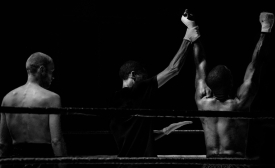Americas
Not too long ago, Karen Hughes discussed her job as director of U.S. public diplomacy efforts as contributing to a long term process of cultivating America's image. For her, the work of public diplomacy remains akin to "planting a tree under whose shade you would not sit." Now the mantle of that responsibility passes to another, as Karen Hughes announced her resignation this week from her post as Undersecretary of State for Public Diplomacy and Public Affairs.
This September, the United States Department of State launched its own blog – Dipnote. The blog is described as an “alternative source to mainstream media for U.S. foreign policy information” and an “opportunity for participants to discuss important foreign policy issues with senior Department officials.” Seems pretty ambitious. If anything, this belated foray into the blogosphere is a necessary if not crucial step towards making the State Department more relevant to its U.S.
I’m just back from the State of Play V conference in Singapore. Congratulations to Dan Hunter, Beth Noveck and Aaron Delwiche for having the vision to host State of Play in Singapore, and the perseverance to keep it there despite the challenges of fundraising for and coordinating a conference 8,000 miles away. Thanks to the MacArthur Foundation for supporting it financially.
As with previous State of Plays I came away intellectually enriched. Moreover, I learned something new and unexpected—and not necessarily from the sources I anticipated.
The New York Times published an interview with the United States Undersecretary for Public Diplomacy, Karen Hughes, on August 28, 2007. The interview was conducted by Robert McMahon of the Council on Foreign Relations and can be found here.
In 2006 the modestly budgeted Disney Channel film High School Musical unexpectedly became a world-wide smash hit, with some 200 million mostly 9-14 year old “tweener” female viewers spread across some 100 countries. Just last week Disney rolled out the blockbuster sequel, “High School Musical Two,” in the US and kicked off a global marketing campaign with a 24-hour series of conference calls with Disney partners in, once again, over 100 countries.
Since September 11th much of our nation's public diplomacy efforts have been focused, appropriately enough, on the Middle East and the Islamic world. However, while much energy and attention has gone to improve understanding of America and its policies in those regions another important sphere has been neglected. The Russian government is now clearly conducting a concerted effort to indoctrinate its people, particularly its young people, in anti-Americanism. America is hardly the Kremlin's only target. Indeed, the list is a long one -- Georgia, Ukraine, Estonia, Britain, etc.
As the new Chairman of the Broadcasting Board of Governors, James K. Glassman is the U.S. government's number one broadcaster. An accomplished journalist, Mr. Glassman oversees all U.S. government non-military international broadcast channels. The BBG Chairman provided his unvarnished observations to Worldcasting this week.

A look at the U.S. State Department's ECA initiatives during Karen Hughes' tenure.







